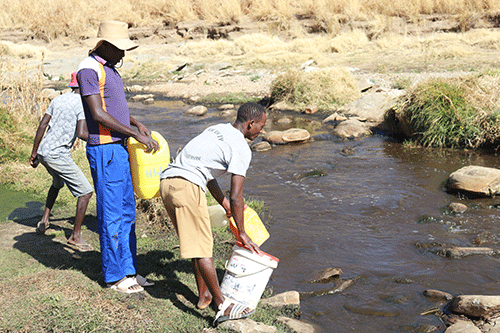Khomas governor Laura McLeod-Katjirua has expressed concern over residents drawing water from the riverbed, and described the situation as risky, saying there is a need for urgent intervention of water provision to the affected people.
Katjirua confirmed she visited the area on Sunday following the New Era article published last week, where more than 120 residents of the Hadino Hishongwa location in the mountainous area behind Goreangab in the Samora Machel constituency are forced to drink wastewater that is not fit for human consumption.
This is due to a lack of water points as well as unaffordable and inaccessible prepaid cards (water tokens) in the area.
Community members say they are aware the water is dirty and not fit for human consumption, but that they have no option after the city halted the free water they were receiving during the Covid-19 lockdowns.
They treat the water to be clearer by pouring ash on top of it in a container.
They also said tokens used to cost N$150 but the price increased to N$300.
“The situation is real; we can not deny it. I was there on Sunday and found many people to whom we spoke. We confirmed that indeed people are drinking dirty water because the existing water tap is a distance of maybe two kilometres, while the area they draw water is 100 metres away. However, it is riskier that the water is coming from an adjusted private farm,” the governor said.
She said although the Khomas Regional Council observed and confirmed the situation, there is nothing it can do in terms of water provision to those people, as the responsibility lies with the City of Windhoek.
“For now, it is difficult to prevent those people from drawing water from the riverbed. The reason is the lack of accessibility, as people do not have water tokens because they do not have the check number, and then the distance itself. The only solution is the water pipes to be extended to the people and the provision of check numbers to enable them to be issued with token cards,” she recommended.
The residents draw water from a river that flows from the Goreangab sewage dam, but they also fear for their safety, as they are trespassing on private land.
To compound their fear, Samuel Jusias, a community leader, told New Era the residents’ health is at stake, as they always have stomach problems because they drink and cook with contaminated water.
The disgruntled community members also say they are now “victims of the City of Windhoek’s failure”.
The group collects the day’s water that runs through a locked farm gate.
The community includes 46 families, who were placed there by the City of Windhoek on 28 December 2021.
Despite the governor expressing concern over the situation, the city’s spokesperson Harold Akwenye said, following the article in the New Era on Wednesday, 10 August 2022, a verification inspection was conducted to investigate the allegations.
“Thus, in light of the above, representatives from health and environment services inspected the Hadino Hishongwa informal settlement on 15 August 2022. Findings observed the allegation of people getting water from the overflowing river from Goreangab sewage ponds could not be established, as only one resident indicated they sometimes draw water there for watering [their gardens] purposes only,” he said.
He added the residents have access to water from the municipal standpipes, with the furthest household situated about one kilometre from a water point.
“The community members are aware the water from the river is not fit for human consumption, and they requested that the municipality considers bringing water points closer to them,” he said.
Akwenye said the team recommended the water pipeline be extended up to the end of the settlement to bring standpipes within 50 to 60 metres from households.
According to him, the team also recommended intense health promotion in the area of waste management, hand washing, the dangers of using water from an unreliable source as well as for the municipality to conduct routine inspections and continuous engagement with the community to ensure no one uses water from the river.
– ljason@nepc.com.na


